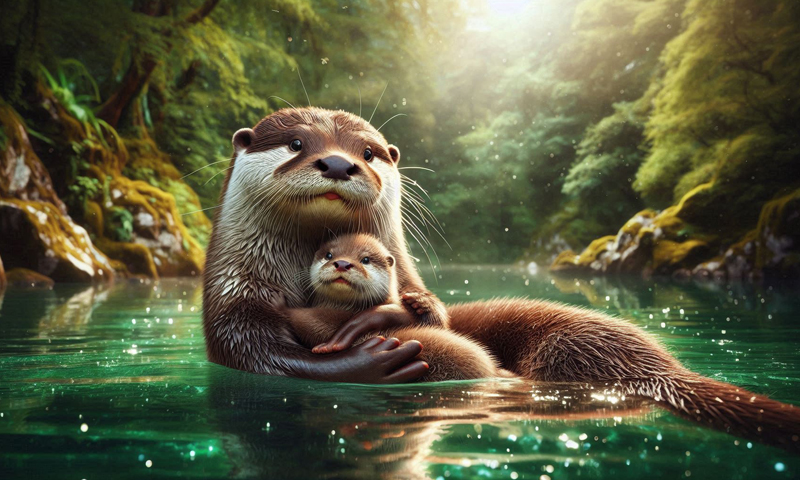Otters are among the most cunning and skilled predators in the animal kingdom. While they primarily reside in aquatic environments, they are equally comfortable moving on land. Very few furry mammals have successfully adapted to aquatic habitats as otters have. Their exceptional fishing skills make them dominant hunters in water, allowing them to thrive in various ecosystems. Otters can still be found in rivers across almost all continents.
Habitat and Distribution of Otters
Otters are distributed across almost every continent, with their primary habitats being in North America, Europe, Asia, and South America. Different species of otters exist, such as the European Otter, Giant Otter, and Asian Small-Clawed Otter, each adapted to their specific environment.
Otters prefer regions rich in water bodies, such as rivers, lakes, and coastal wetlands, with abundant vegetation nearby. Their dens or shelters are usually burrowed into riverbanks, with entrances often submerged underwater. This unique adaptation helps them evade predators and provides a safe space for resting and raising their young.
Physical Characteristics and Adaptations
Otters possess long, dense fur that helps them stay warm in water. Their short yet powerful legs, coupled with webbed feet, allow them to glide effortlessly through the water. They have a strong, muscular tail that assists in changing direction swiftly while swimming. Additionally, their thick and oily fur prevents water from reaching their skin, helping them regulate body temperature in cold aquatic environments.
Social Life and Family Bonds
Most otters lead a solitary lifestyle. However, in parts of Asia and South America, they form large families. An otter family can consist of up to 17 members. These mammals exhibit strong social bonding behaviors, frequently grooming each other. Grooming not only keeps their fur clean but also strengthens familial connections.
Hunting Strategies and Diet
Otters primarily feed on fish, crabs, frogs, small mammals, and occasionally birds. Their sharp teeth and strong jaws enable them to grasp and consume prey effectively. Being swift swimmers with the ability to stay underwater for extended periods gives them an advantage in hunting.
Group hunting significantly increases their efficiency in catching fish. When otter pups reach four months of age, they begin training for hunting. Adult otters share their catches with younger ones, demonstrating a fascinating example of cooperative behavior within their social structure.
Otters vs. Crocodiles: A Battle of Strength
One of the most remarkable aspects of otter behavior is their fearless attitude toward larger predators, particularly crocodiles. Crocodiles, reaching lengths of up to 13 feet, can easily overpower a lone otter. However, otters, known for their intelligence and teamwork, often turn the tables on these formidable reptiles.
If a crocodile mistakenly enters an otter territory, it becomes vulnerable rather than dominant. Due to their speed, strategic teamwork, and persistence, groups of otters can chase away or even kill crocodiles. This demonstrates the sheer power of collective strength in the animal kingdom.
Lessons Humans Can Learn from Otters
Otters teach us a valuable lesson in unity and cooperation. Just as a single otter is no match for a crocodile, individual efforts often fall short in the face of great challenges. However, by working together, even seemingly impossible obstacles can be overcome. History has repeatedly shown that humanity has achieved the impossible through collective effort and unity.
The Importance of Otters in Ecosystems
Otters play a crucial role in maintaining the balance of aquatic ecosystems. By preying on fish and other water-dwelling creatures, they help regulate populations and prevent ecological imbalances. Unfortunately, due to habitat destruction, pollution, and illegal hunting, otter populations are declining at an alarming rate. Several species are now listed as endangered.
Conservation organizations and environmental activists are working to protect otters. Measures such as preserving wetlands, increasing public awareness, and enforcing strict anti-poaching laws can ensure the survival of these fascinating creatures.
Otters are not just another species in the wild—they are a true marvel of nature. Their intelligence, social behavior, and teamwork make them one of the most fascinating creatures on the planet. If we apply the lessons they teach—cooperation, resilience, and adaptability—we can tackle the greatest challenges of our society. Furthermore, by prioritizing conservation efforts, we can ensure that otters continue to play their vital role in maintaining healthy aquatic ecosystems.











